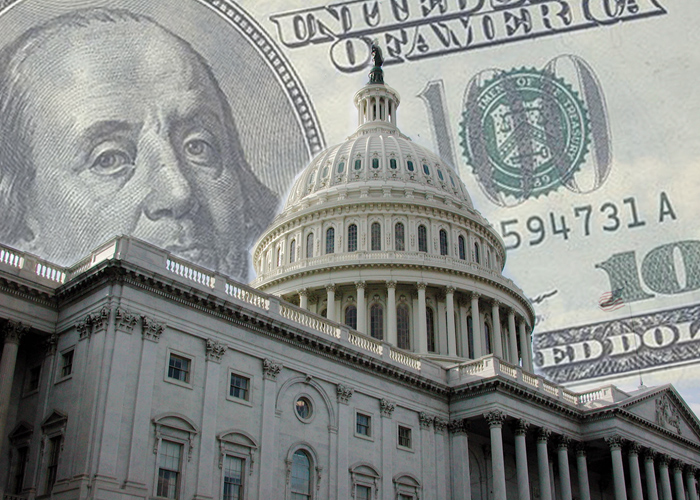The weakening of the Senate proposal on financial reform unveiled this week, after lobbying from the pay-day lending industry, should come as little surprise. In recent years, the industry has built a sophisticated Washington lobbying and public relations operation, which it has used to promote its interests, savage its critics, and shape the public debate.
The $42-billion-a-year pay-day lending industry offers short-term loans often designed to tide customers over until their next pay-check. But the loans, which can carry interest rates of as much as 400 percent on an annualized basis, lead many working-class borrowers to end up digging themselves deeper into debt. As a result, the pay-day lenders have become a prime target of consumer advocates and their allies on Congress, who accuse the industry of preying on struggling Americans, and have in recent years sought ways to rein it in.
To counter that threat, the industry has developed a powerful presence in the capital. In 1999, W. Allan Jones, the high-living pay-day lender entrepreneur (his 400-acre Tennessee home boasts an air-conditioned muscle car garage and a regulation-sized football field) helped create the Community Financial Services Association (CFSA), a lobby group designed to put a respectable gloss on the industry. Last year, CFSA spent over $2.5 million lobbying Congress on the financial regulatory reform and other issues affecting regulation of the pay-day loan industry. Among the veteran lobbyists working for CFSA is Wright Andrews, who earlier in the decade did similar work for the sub-prime mortgage industry, and Timothy Rupli, whose Capitol Hill townhouse reportedly has been the site of 96 political fundraisers since the start of 2008.
But CFSA also works to shape public opinion. It runs a frequently updated blog, PayDayPundit.org, which acts as a kind of clearinghouse for pro-industry talking points, and slams what it sees as “biased coverage” of the pay-day lenders. “The Huffington Post is in full force in pushing financial reform. They have beat reporters and columnists all marching in lock step to browbeat the Congress into passing the most onerous, anti-business bill it can,” PayDay Pundit recently warned. It called a recent TPMmuckraker story on the Senate proposal “biased and insane.”
Steven Schlein, a PR specialist with top Washington PR firm Dezenhall Resources, who acts as a spokesman for CFSA, is one of three contributors to PayDayPundit.com, he told TPMmuckraker. In an email, Schlein also accused TPMmuckraker of being “obsessed with our lobbying activities,” and asked: “Is it the position of TPM that only public interest groups and the Left should have access to Congress?  Lobbying is as protected by the First Amendment and (sic) the media is.” Â
Dezenhall is itself a key player in the capital’s influence-shaping trade. Founded by former Reagan administration communications aide Eric Dezenhall (co-author of the 2007 book Damage Control: How to Get the Upper Hand When Your Business is Under Attack) it bills itself as “the nation’s leading high-stakes communications consultancy.”
There’s even another website, irresponsiblelending.org, that’s dedicated to attacking the Center for Responsible Lending (CRL), one of the most vocal consumer groups raising concerns about the pay-day lending industry. The site makes much of the fact that the California philanthropist Herb Sandler, a major donor to CRL, reportedly profited by pioneering one of the exotic and risky mortgage products that helped trigger the housing bubble — a criticism that sits uneasily with the sub-prime background of Andrews, the pay-day lenders’ top lobbyist. A mock tag-line on the site’s homepage declares, assuming the voice of CRL: “The Center for Responsible Lending is a for-profit, politically-motivated PR and lobbying organization dedicated to protecting our corporate donors’ profits, by working to demonize and eliminate all competition,” and slams CRL for “demanding responsible lending practices from everyone but ourselves.”
PayDayPundit.org has promoted irresponsiblelending.org, calling it “must see TV,” but Schlein said CFSA is not behind the latter site. An inquiry sent to an email address on the site did not immediately receive a response.
As active as it is, CFSA isn’t even the only lobby group going to bat for the pay-day lenders. The Financial Service Centers of America, a trade association for pay-day lenders and other “neighborhood financial service outlets,” last year spent over $200,000 lobbying Congress on issues affecting regulation of the industry, according to lobby disclosure reports examined by TPMmuckraker. That effort was handled by MWW Group, itself a heavy-hitting Washington lobbying and PR firm whose clients include giants like McDonald’s and United Healthcare.
There’s little doubt that the industry’s wide-ranging bid to boost its influence has paid off. To the frustration of consumer advocates, the Senate’s proposal on financial reform won’t give the new consumer agency the automatic authority to enforce rules against all pay-day lenders. Sen. Bob Corker (R-TN) was said to be particularly receptive to the lenders’ arguments. The House bill passed in December, though stronger, also was reportedly watered down after lobbying by the industry. Of that bill, Schlein told the Huffington Post: “We have lobbyists, and they made their point.”









